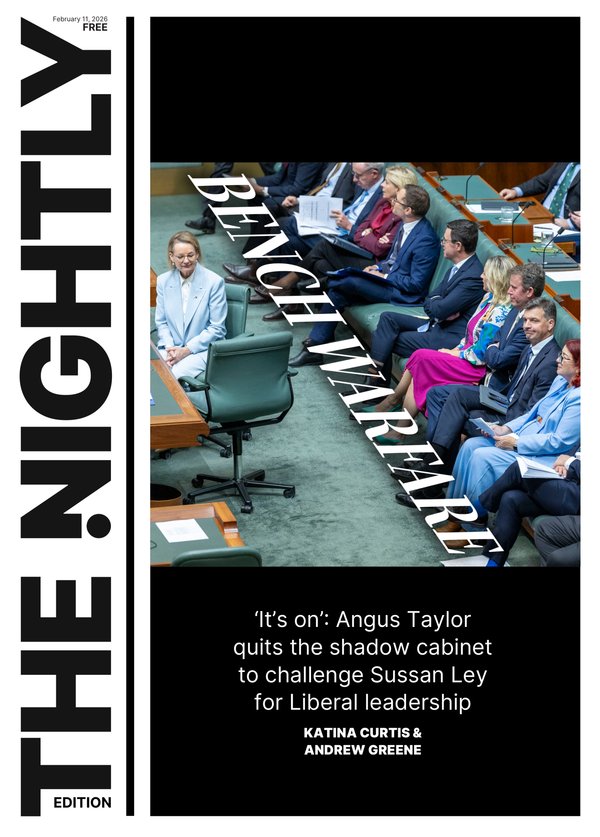Ann Vanstone’s ICAC SA exit should make you concerned about corruption and state control over the watchdog
MIKE SMITHSON: The swift and unexpected resignation of an ICAC commissioner just highlights that corruption and control are alive and well in Australia.

The secretive independent anti-corruption watchdog in South Australia suddenly has a swinging front door and is sinking its teeth into the State’s top lawmaker.
ICAC commissioner Ann Vanstone announced, without warning, that she’s quitting the controversial top job three years early because she’s run out of steam.
That’s the polite way of saying she’s frustrated, hamstrung, feeling gagged and can no longer tolerate many politicians, in particular SA Attorney-General Kyam Maher.
Sign up to The Nightly's newsletters.
Get the first look at the digital newspaper, curated daily stories and breaking headlines delivered to your inbox.
By continuing you agree to our Terms and Privacy Policy.It’s been a slow burn, but she’s now lit the fuse on new political murkiness.
Ms Vanstone’s considerable powers were watered down by a unanimous parliamentary vote in 2021.
Law changes meant she could no longer investigate public office maladministration and misconduct.
What would strike fear most into the heart of any politician?
A secret investigation involving them on either of those charges.
NSW’s ICAC has notoriously also been linked to controversy with claims of civil rights abuse against its politicians stretching back over decades.
Against that backdrop and in less than 24 hours, allegedly a record in SA’s Parliament, all 67 voting MPs gave a tick of approval to restrict her powers.
Relations between her and two successive State governments have gone downhill at breakneck speed ever since.
Ms Vanstone’s sudden resignation statement blindsided the parliament and the Attorney-General.
She bluntly said it was prompted by numerous factors, some personal, but most professional.
If that isn’t a less-than-subtle hint, then what is?
In one of her many parting shots, she claimed the law changes have damaged the scheme, under the guise of making it effective and efficient.
It’s not just idle chatter from the sister-in-law of former Federal senator Amanda Vanstone.
In a recent radio interview, the commissioner confirmed that only one ICAC case in the past 12 months had been passed on to police for possible prosecution.
Her reasoning is just as blunt.
She says it’s pointless because the cases rarely progress further.
So, what value for money are taxpayers getting for their $11 million annual investment into the agency?
I would say stuff-all, but she strongly argues plenty of crucial education and prevention work goes unseen by the public and probably politicians.
She openly claims the A-G doesn’t listen to what she says, publicly declaring her own comments have fallen on deaf ears.
It’s seriously like an episode of the British satirical television show Yes Minister.
Ms Vanstone says the protocols for referring corruption cases higher up the chain are absurd.
ICAC investigators aren’t even allowed to speak to prosecutors in any potential case, meaning three agencies never share their collective intelligence.
She openly admits corrupt activities are now going unchecked in the SA community.
So why did she stay in the role for even four years under such frustration?
She says she naively expected the weaknesses and issues identified would be addressed.
Not only hadn’t they been dealt with, but she also had no confidence of success if she stayed on.
In short, Ms Vanstone wishes her replacement success where she has failed.
It’s hardly a great advertisement for attracting the best possible candidate to fill her ICAC shoes.
Who would want the job, whatever the pay packet, when the only two commissioners in the agency’s 11-year history have both left after considerable turbulence surrounding the ICAC Act?
Does the Parliament want to control the head of the State’s so-called independent watchdog?
If so, that defeats the purpose of establishing it in the first place.
Kyam Maher has tried to play down their differences of opinion.
He considers Ms Vanstone to have been given a good hearing and has easy access to him and his office.
But his explanations are far from convincing.
In a short official statement, he announced she was stepping down on September 6 and thanked her for her service.
The Government seems more intent on filling the vacancy, than reflecting on what’s gone so badly wrong.
Since her departure news, some politicians have indicated their rushed decision to restrict her powers may have been too hasty.
No kidding.
Anti-corruption commissions in any Australian State will always have pressure points with the government of the day.
And they take time to win political favour, with the new Federal body only established last year.
But in this case, the anger and frustration from Ms Vanstone, an esteemed former Supreme Court judge, must not be discarded lightly.
It builds little confidence in an important agency that must be right on its game.
If not, corruption will be allowed to flourish amid the confusion of so many dangerous distractions.
Mike Smithson is chief reporter and presenter for 7NEWS Adelaide.
